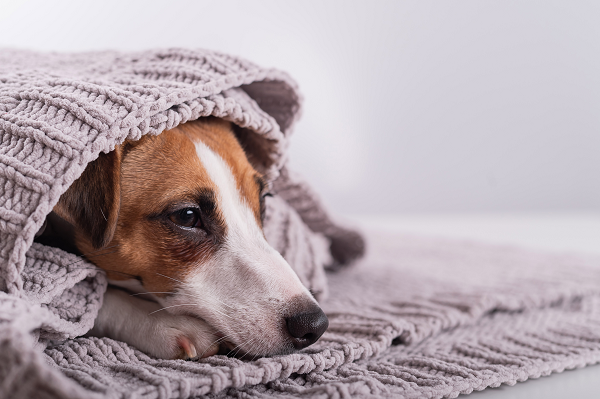
As summer swings into full gear, it’s a good time to consider the effects of the booming noise from fireworks and thunderstorms on dogs.
Thunderstorms are common in summer. You know the feeling – it’s a warm afternoon, the air changes, and you hear rumbling in the distance. It’s a sure sign that a storm is on its way.
Some dogs don’t seem bothered by storms, while others have great difficulties dealing with them. They may cower, pace, pant, tremble, hide, bark, or even try to escape. They may seek your comfort – or they may prefer to hide away somewhere dark and quiet. If your dog is sensitive to storms, you may notice their anxiety a long time before you hear the storm!
In addition to storms, fireworks are also common in summer, as countries around the world celebrate national holidays. While we enjoy the show, our dogs may not. The noise and light of fireworks sound the same as a thunderstorm to your pup.
Fear of loud noises is natural and common in dogs and arises from their instinct to survive. When a dog faces a threatening situation (strange sound, animal, or person), their fear helps to protect them from harm. Their fear alerts them to potential danger and stimulates a “fight or flight” response to keep them safe, by either approaching the danger or fleeing from it.
The problem arises when dogs develop an excessive fear, which turns into a phobia. Dogs with an extreme fear of thunderstorms react adversely to the noise, as well as the associated lightning, change in barometric pressure, windy conditions, and darkening sky. They may react the same way when exposed to the similar loud noises of fireworks. When noise-phobic dogs get really scared, they act out.
There are steps you can take to deal with thunderstorm and fireworks phobia in your dog.
Create a Safe Space
- Find the most soundproof area of your home, like your basement or an inner room, and make it a calm, safe space for your pet to retreat during a storm.
- Close any curtains to shut out visual signals.
- Provide white noise to offset loud sounds. You can use a white noise machine or fan, or just the radio or television.
- Put their bed or blanket in the room as a place to rest.
- If your dog enjoys being in their crate, move it to the safe room or cover the crate with blankets to block out the light show created by lightning and muffle the sound of the storm or fireworks.
- Keep a bowl of water in the room, and a favorite toy.
Distract
- Keep your dog preoccupied with special toys or treats in a puzzle toy (e.g., Kong, treat ball).
- Spend time with your dog and play with them, if they seem to respond well to that.
Provide Comfort
- Some dogs respond well to “swaddling”, much as newborn babies do. Many dogs feel secure when placed in a weighted dog vest or anti-anxiety wrap. Ask your veterinarian about these options.
- Be calm and quiet with your dog – they will sense and reflect your emotions. Do not fuss or try to reassure your dog when he is scared, since he may regard this as a reward for the behavior he is engaging in at that time. By rewarding the behavior, it may become increasingly intense with each future exposure.
- If your pet seeks solitude, let them have it, but check in regularly.
Don’t Make it Worse
- Never set fireworks off near your dog. If you may be near fireworks, leave your dog at home.
- Never punish or reprimand your dog for their behavior or accidents that happen when they’re scared – this will only increase their anxiety.
Consider Professional Help
If your dog’s fear of thunderstorms persists or intensifies, despite your efforts, consult your dog’s veterinary team or a veterinary behaviorist. These experts can provide specialized guidance, develop a tailored behavior modification plan, and, if necessary, recommend anti-anxiety medications to help your dog cope with severe storm-related anxiety.
Don’t let thunderstorms and festivities spoil summer for your dog. With some time, patience, support, and planning, you can help your dog get through the inevitable “booms” that will happen this season!
